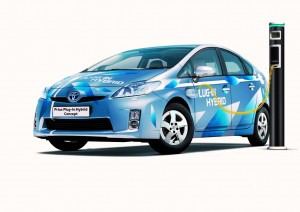
The Prius Concept can drive in full electric mode at speeds up to 62 mph with a range of 12.5 miles.
Toyota is determined to keep its leading position as a manufacturer of “sustainable” with the ultimate eco car as one of its main goals, whatever that means.
The Japanese company is striving for more diversity of energy usage and see the plug-in hybrid (PHV) as another step in the ongoing development of hybrid technology.
At the IAA, Toyota showed the 2010 Prius Plug-in Hybrid Concept, which is based on the third generation Prius now on sale. It expands Toyota’s hybrid drive technology with the use of the lithium-ion batteries.
A plug-in hybrid vehicle basically operates as an electric vehicle on short trips and as a conventional hybrid vehicle on longer ones. Its electric vehicle attributes mean it has a longer total cruising distance and better overall fuel efficiency than a conventional hybrid; this means lower fossil fuel consumption and, thus, reduced CO2 emissions and atmospheric pollution. But because it is a hybrid vehicle, it can run regardless of battery charge and is not completely dependent on a battery-charging infrastructure.
The Prius Concept can drive in full electric mode (EV mode) up to 62 mph with a range of some 12.5 miles, after which it will revert to hybrid mode and work as a normal Prius. This might allow it to run proposed regulatory tests in electric mode only and come up with credits so it can sell larger cars.
With the lithium battery, it only takes 90 minutes to lead the battery pack through a non-standard wall socket of 220/230 Volts.
Toyota says that in 2015, some 70% of all Europeans will live in an urban environment and that research among commuters in Britain and France has showed that 80% of all road trips are less than 15 miles. In France and Britain, 55% and 80% respectively, are shorter than six miles. The CO2 emissions of the Prius PHV are less than 60 g/Km, depending on how you do the calculation.
Early next year Toyota will begin with delivery of 500 Prius PHV units to lease companies for testing, while 150 cars will be available for European fleet owners. The program will allow Toyota to get feed back from customers about their expectations of PHV-technology. It will also allow evaluation of the lithium-ion battery’s performance, reliability and durability.
